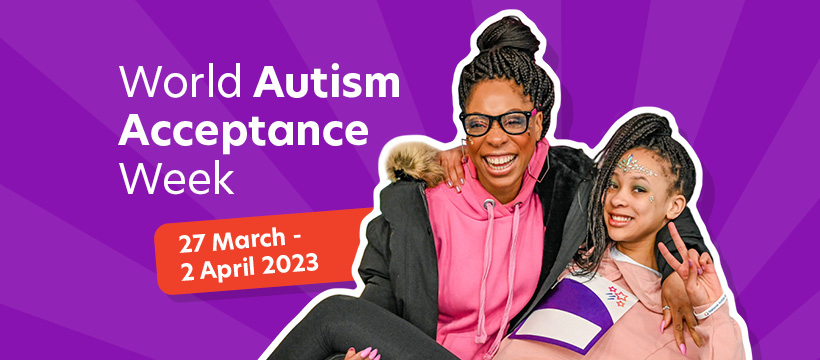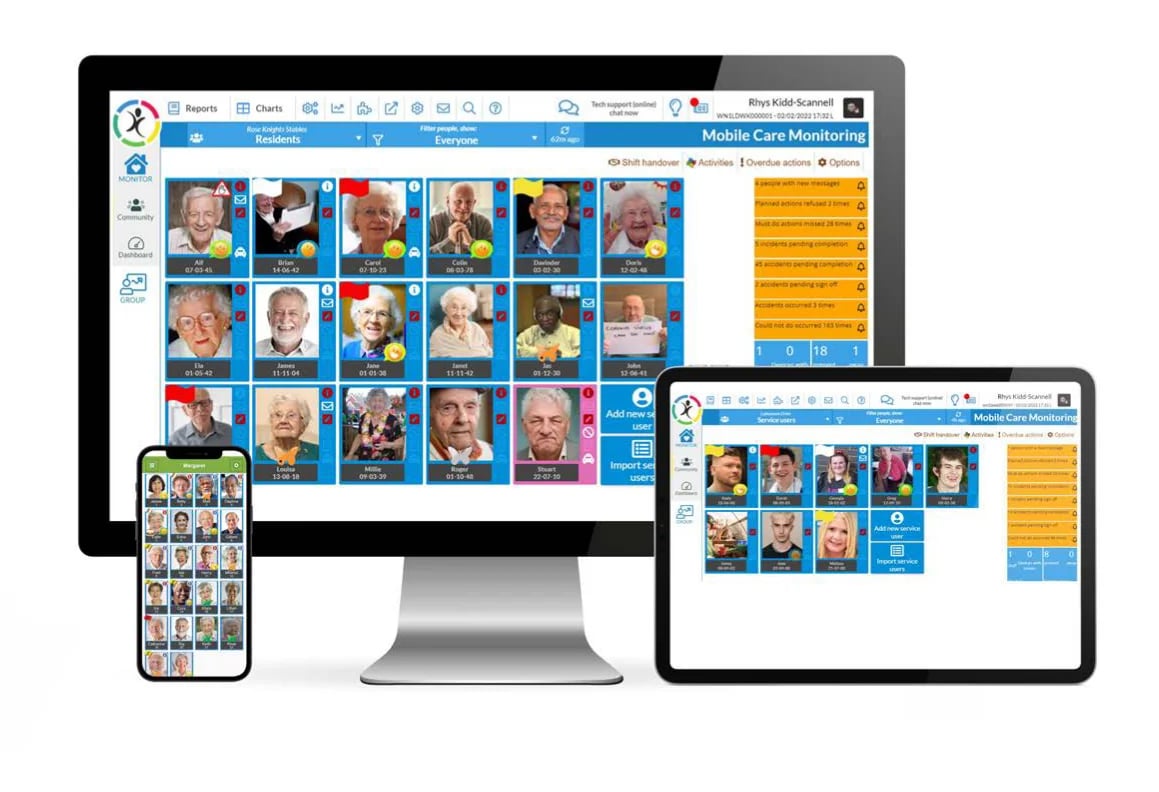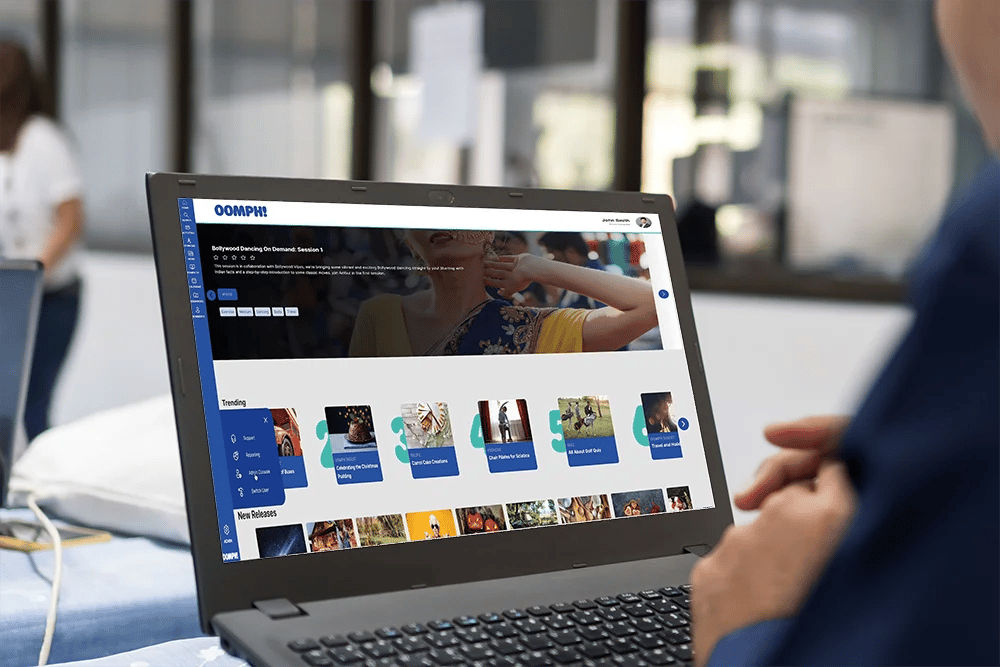World Autism Acceptance Week 2023
World Autism Acceptance Week is held during the week coinciding with Autism Acceptance Day. This year, it takes place from 27th March to 2nd April 2023.
Get involved in World Autism Acceptance Week
The National Autistic Society, the UK's leading charity for autistic people and their families, is on a mission to create a society that works for autistic people - and every penny you raise this World Autism Acceptance Week will help them achieve this goal.
This year's theme is colour, and the National Autistic Society is holding a virtual fundraising challenge called The Spectrum Colour Challenge, so whether you want to come up with something creative or keep it simple, World Autism Acceptance Week is the perfect time to get involved.

The first ever Autism Acceptance Week (then called Autism Awareness Week) dates back to 2nd April 2007. The National Autistic Society changed the name of its Autism Awareness Week to Autism Acceptance Week in recognition that there is now a much more widespread awareness of the spectrum condition. The name change also reflects what autistic people say society should focus on, accepting and accommodating autism.
Helping to raise awareness
What is autism?
Autism, also referred to as autism spectrum disorder, is a lifelong developmental disability that affects how people communicate and interact with the world.
More than one in 100 people are on the autism spectrum, and there are around 700,000 autistic adults and children in the UK.
The word ‘spectrum’ refers to how autism is experienced differently by different people. Autism is considered a spectrum because it’s different for every autistic person.
Autistic people vary greatly in their support needs. For example, some may need no support at all, some live independently and might need minor adjustments at school or work, such as support with certain tasks, while others may need 24-hour specialist support.
It’s important to know that autism spectrum disorder (ASD) is not a learning disability; autism is a spectrum disorder which means autistic people can have varying support needs. However, one-third of autistic people also have a learning disability.
Autistic people may act differently from other people. Autistic people may:
- Find it hard to communicate and interact with others
- Have difficulty understanding how other people think or feel
- Take longer to understand information
- Feel overwhelmed, stressed, or uncomfortable by things like bright lights or loud noises
- Do or think the same things over and over
- Feel anxious or upset about unfamiliar situations and social events
Building the right support
Mencap, a UK charity for people with a learning disability, has estimated that approximately 1.5 million people have a learning disability in the UK. Roughly 1.3 million of those people with a learning disability are in England. In addition, reported by the BMA, it's estimated that around 700,000 people in the UK have a diagnosis of autism.
Every person, whether they have autism or a learning disability, or both, has the right to live an ordinary life. Health and social care providers must ensure everyone has choices, dignity, independence and good access to local communities.
When in the hospital, everyone has a right to expect the following:
- From the first point of contact with a hospital, people should have access to the care they need at the right time when needed, along with appropriate reasonable adjustments to meet their individual needs. Not only is this good practice, but it is also a legal requirement.
- The staff communicates with the individual and involves them in making decisions about their care to meet their needs.
- The individual has full involvement in the treatment and care they receive.
- Staff provide treatment and care that meets the individual’s needs, including making reasonable adjustments where necessary and considering any equality characteristics like age, disability, gender reassignment, pregnancy and maternity, race, religion or belief, sex and sexual orientation.
- People’s care experiences do not depend on whether or not they have access to specialist teams and practitioners.
The Care Quality Commission recently published a report called 'Who I am Matters'. The report discusses the experiences of what it's like in a hospital for people with autism and people with a learning disability.
According to the report, people with autism and people with a learning disability still aren't getting the care they need when they need it. It also provides insight into how these failings have impacted people and their families.
CQC’s Director for People with a learning disability and autistic people, Debbie Ivanova, said:

"For too long, people with a learning disability and autistic people have not been getting the care they need, when they need it.
This is distressing for individuals, their families, and carers but can also significantly affect health outcomes.
We know that better communication, real involvement and appropriate adjustments are all keys to improving people's experiences of care when in the hospital. During our time in hospitals, looking at how care and treatment were delivered, we saw pockets of excellent work. However, nowhere did we see this happening in a way which was joined up or consistent.
We are determined to improve the care for people with a learning disability and autistic people. Now is the time for action, and I encourage all health and care leaders to use the learning from our report to drive improvement – to recognise and respect each person's humanity and individuality and respond differently."
Considering and meeting the needs of autistic people and people with a learning disability
Health and social care professionals must understand the needs of autistic people and people with a learning disability and recognise common challenges such as sensory overload, social anxiety, obsessive-compulsive disorder (OCD) etc. This can help if someone is feeling overwhelmed. For example, sensory overload is common in people who are autistic and people with a learning disability, including people with neurodiverse conditions, such as ADHD and Dyslexia. This can be a positive thing but can also cause distress or discomfort.

Everybody wants to be treated equally. Therefore, a safe and supportive environment is important for people who need to be understood and supported in terms of their needs and diagnoses. With Person Centred Software's 'Who I Am' feature, health and care professionals can be truly person-centred and understand people's individual needs as it contains all the information health and care professionals require.
Potential barriers to accessing healthcare for autistic people
Accessing health services can be an incredibly stressful experience for people with autism, their family members and the carers supporting them.
Autistic people commonly experience poor mental and physical health due to the barriers they face when accessing health services, including difficulties interacting with healthcare providers. For example, those with autism may find it difficult to make an appointment as they may find it hard to communicate and interact with others, speak to a stranger, or use a phone. Additionally, autistic people report that their senses frequently overwhelm them, so they have trouble focusing on conversations with healthcare professionals, leaving them feeling like they did not receive help. Furthermore, autistic people also report experiencing shutdowns or meltdowns when setting up an appointment to see a healthcare professional, leading to the person not going back for treatment and missing out on potential early detection, diagnosis and intervention. These barriers to making appointments can sometimes contribute to known healthcare disparities, including increased morbidity and mortality.
There are also a lot of myths and stereotypes about autism, one being that individuals with autism are unintelligent - this isn't true. As noted above, everybody with autism is different, and individuals with autism have a wide range of intelligence, just like any other individual. Autism can also be diagnosed in highly intelligent individuals and doesn't directly affect an individual's intelligence.
"When seeking to combat the stigma that unfortunately still prevails regarding autism, it is essential to fundamentally both acknowledge and accept the rich diversity of cognitive functioning so that those who fall somewhere on the autistic spectrum are able to receive the love, companionship and understanding that we all need to lead long, fulfilling lives".
Declan Woodward-Brown was 12 when he learned he had autism
''Many adults with autism are not getting the support they need - this is having devastating consequences for autistic people: widespread isolation, mental health problems, and people falling into crisis.
Autism is often referred to as the 'invisible disability', and I think this is true, particularly for anyone who has 'high-functioning' autism' as others see them to be both physically and verbally able; therefore, people struggle to emphasise that autism is a real condition and should be respected as such.''
Parent of a 25-year-old young man with autism
Health and social care providers are responsible for guaranteeing that autistic people and people with a learning disability have the choices, dignity, independence and good access to local communities that most people take for granted.
How the care sector is helping to break down barriers
Improving the lives of autistic people is the focus of a new multi-million-pound strategy launched by the Department of Health and Social Care on 21 July 2021.
Following engagement with autistic people, their families and carers, the government developed a five-year plan, backed by nearly £75 million in the first year, which aims to:
- Tackle the inequalities and barriers autistic people face so they can live independent and fulfilled lives
- Speed up diagnosis and improve support and care for autistic people
- Provide better access to health and social care for autistic people of all ages
- Support autistic children and adults through better access to education and more help to get into work
Autistic people face multiple disadvantages throughout their lives, with too many struggling to get the support they need, often leaving them lonely or isolated.
The new strategy aims to help create a society that truly understands and includes autistic people in all aspects of life, helping to reduce diagnosis waiting times for children and adults and improving community support for autistic people.
How Person Centred Software’s Digital Care Planning System is helping to break down barriers
World Autism Acceptance Week, which takes place every year, aims to help create a society that works for autistic people. Unfortunately, as mentioned above, it is well known that autistic people and people with a learning disability experience some of the worst health inequalities.
For autistic people who need 24-hour specialist support or who have a learning disability, it is essential for care providers to have a committed, resilient, compassionate workforce to combat this, along with a good digital care planning system to assist care providers in delivering high-quality, person-centred care and support.
People working in the care sector can help address some of the issues mentioned above by using software, such as Person Centred Software’s Digital Care Planning System, to share information with health professionals.
To coincide with #WorldAutismAcceptanceWeek, Person Centred Software, a market leader in care home software and provider of the UK's most widely used digital care planning system (Digital Social Care Record), discusses how its Digital Care Planning System supports Learning Disability providers and individuals with autism spectrum disorder who also have a learning disability.

Person Centred Software's Digital Care Planning System has a range of features which support learning disability providers. As the main goal of Person Centred Software is to improve the quality of care and enable a seamless journey for people when moving between services, they have been working hard to integrate and improve the delivery of health and social care services through interoperability and the sharing of data - its 'Who I Am' feature is a good example of this.
What is the 'Who I Am' feature, and what does it do?
The 'Who I Am' feature, part of Person Centred Software's Digital Care Planning System, enables learning disability providers to deliver more responsive and personalised care, helping to improve a person’s quality of life.
Care teams can create a person-centred document of each person they care for with the 'Who I Am' feature, containing personalised information such as:
- What’s important to the individual
- A care plan summary
- Wishes for future care
The feature enables care providers to share vital information about an individual’s routines, life stories and wishes with health and care professionals via the Digital Care Planning System. These personalised routines are vital when caring for those who are vulnerable, as it helps to maintain their daily functions and minimise anxiety.
Improving patient experience with Person Centred Software’s Hospital Pack
Person Centred Software's 'Who I Am' feature also improves the hospital experiences for people receiving care.
The 'Who I Am' feature helps health and care professionals understand people's needs as the information stored in the 'Who I Am' feature is available in the Hospital Pack.
The Hospital Pack automatically collates the information from residents' 'Who I Am' profiles to ensure that health and care professionals fully understand residents at every stage of their health and social care journey. This saves care teams time and effort in preparing documentation when someone is transported to an urgent care setting. In addition, the 'Who I Am' feature conforms to the Professional Record Standards Body (PRSB) ‘About Me’ standard, which contains all the information the NHS requires.
Furthermore, Person Centred Software's 'Who I Am' feature is electronic, so staff can securely access up-to-date information whenever they need it, even offline.
Ensuring physical and mental health needs are met
There are many different journeys occurring daily within a care home, with different people having different needs.
In order to ensure physical and mental health needs are met, it is important that goals are set for each resident and that care providers are able to track progress and track/deliver on outcomes.
For someone being cared for who has autism or a learning disability, or both, a goal might be to make a trip into town on their own or be more independent with their care.
Other goals are the same as those for anyone else in the world.
They want:
- The same level of independence
- A job
- Access to opportunities in the community
- A strong network of supportive friends and family members
- Access all the resources that anyone else would have in our communities
- To go out and be included in society and the communities in which they live
A lot of the time, someone who has autism or a learning disability, or both might need a little extra help and encouragement in order to do the things listed above. Person Centred Software's Goal Tracking and Outcomes feature assists with this and enables care providers to support individuals with their goals and track progress towards meeting them.
The Goal Tracking and Outcomes dashboard delivers a holistic overview of all the goals for each individual receiving care and a variety of charts to track trends and analyse how each person's goals are performing and the outcome.
Click here to read the benefits of using the Goal Tracking and Outcomes feature.
Oomph! On-Demand: The wellbeing and activities platform for residents and staff
Person Centred Software's new Oomph Activities and Wellbeing platform, which provides a range of services around wellbeing activities for residents and staff, helps to enhance the mental, physical and emotional wellbeing of care staff and vulnerable care home residents.

Oomph! On-Demand enables people in care to participate in specialist activity programmes 24-7 - created especially for them based on their needs and personal interests.
Click here to find out more.





.jpg)

.webp?width=80&height=80&name=HTD%20Awards%202023%20Badge%20(4).webp)














